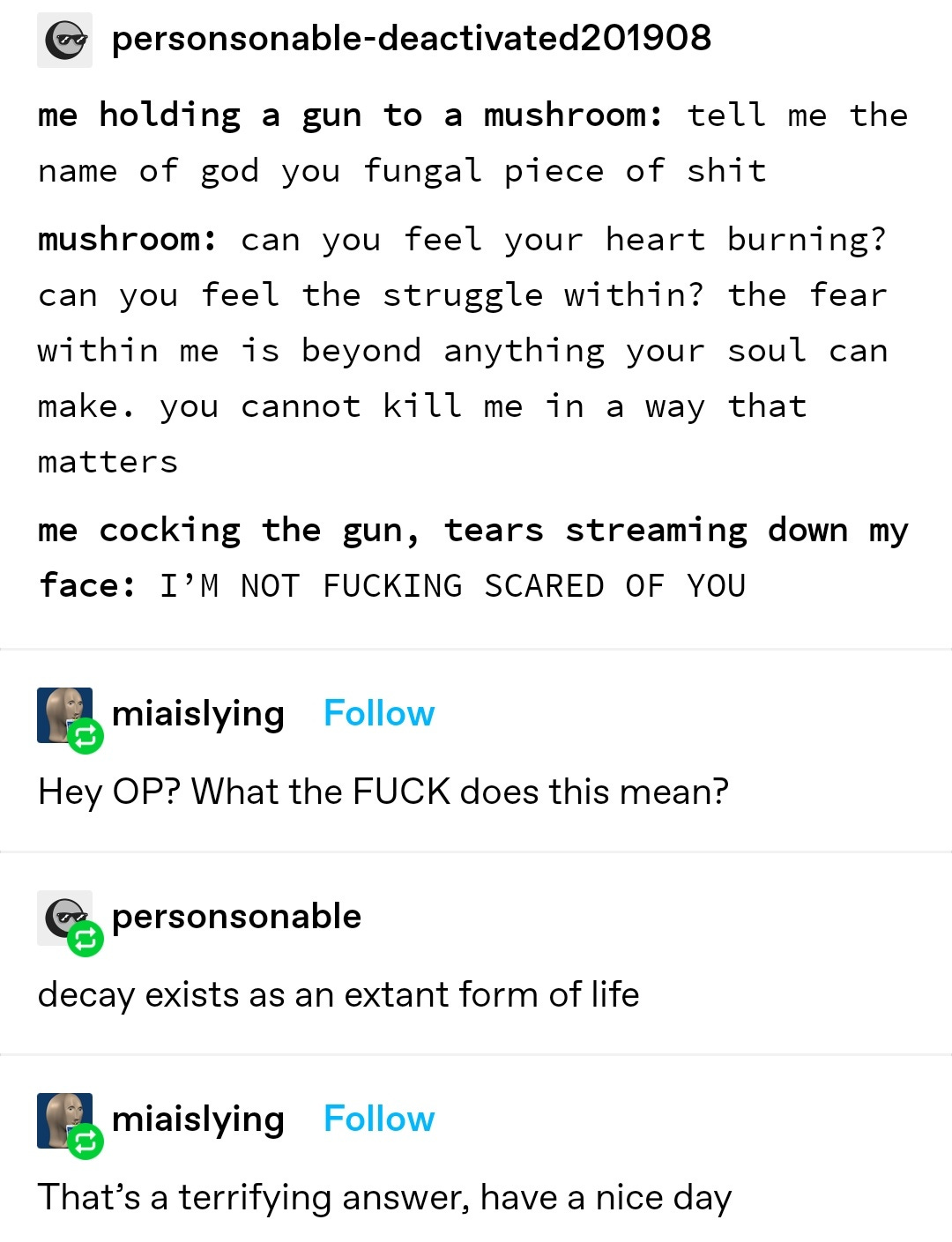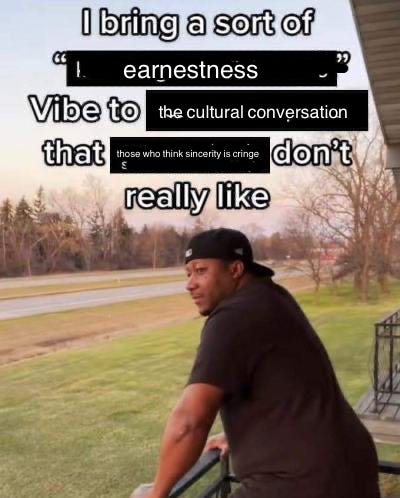Tumblr Prose, The Mind Pearl, and The Fear of Identity In Transition
when anti-intellectualism and the fear of cringe collide
And when they cursed the words, they were cursing me. I was Lucifer cast from heaven. But what heaven belongs to those who torment?
I made that up on the spot for the sake of this essay. I had no idea where I was going with it—it began vaguely related to the coming topics and morphed into something of its own. I feel like it’s written in the image of the sort of prose that can be polarizing. Picture it as a text post alongside a zoomed-in photo of Alexandre Cabanel’s The Fallen Angel for the full experience. Some may read it as pathetically pretentious. A whole lot of words used to say practically nothing. Others read things like that and feel seen. It’s amazing how words can be strung together in new ways for hundreds of years and still perfectly articulate the hard-to-place emotions of someone, somewhere.
Neither party in this scenario is wrong. Yet, neither of them is inherently correct. That’s why I excelled in reading and writing classes but dreaded math growing up. In math and science, there seemed to be two options. Right and wrong. However, I was sure to do well on the essay portion of an English test as long as I demonstrated that I could think critically and eloquently defend my thought process—whether the author intended for someone to come to the same conclusions as me or not.
In online spaces, I’ve noticed a growing aversion to something that’s come to be understood as “Tumblr prose”, though it's not solely confined to the site that bears its namesake. I can best describe it as a writing style that uses superfluous or flowery, vague language to convey a poetic point. It can appear nonsensical at times. Given teenagers are often behind the text posts that gave it an identity, that’s understandable and even to be expected. I’ve fallen victim to reblogging posts with indulgent syntax in my youth and maybe even now if we’re being honest. But I wouldn’t say any of it was a waste of a literary experience (For example, outside the realm of Tumblr, my contemporary brain found The Picture of Dorian Gray to be a little verbose, but I was thankful for the challenge regardless). In fact, it's likely shaped me as the writer I am today. That style of writing isn’t easy to pull off well. I’ve written “bad” freeform poetry and there’s no guarantee I won’t do it again. As a visual artist, I have the same approach to painting. And when I practice my bass playing too. You don’t sincerely grow as an artist if you live with the fear of making something bad, or worse, cringe.
So, is Tumblr prose really that huge of an issue in the grand scheme of it all? I think it's leagues better than someone plugging a half-baked prompt into generative AI software. Sometimes, if the author has a clear vision, it can truly be an exercise in exploring the artistic possibilities of the written word. The internet watching you sputter out prose poetry builds mental strength in a way ChatGPT can’t. And what if those standing around jeering and pointing their fingers behind a screen offered constructive criticism instead? These same people occasionally overlap with those lacking the tools to decipher whether said prose is ironic or not, bordering on hypocrisy. Some of it has the potential to be profound. Some of it is profound. Writing (and by extension, reading) are skills to be polished with time and dedication. The pearl of your mind doesn’t appear overnight. Our identities are malleable and take years to solidify. “Media literacy” is a term that’s thrown around a lot lately. I can’t help but wonder if our current lack of it relates to how we treat those exploring art in ways we don’t immediately identify with.
And how does that tie into the culture’s general attachment to very black-and-white thinking, causing waves of discourse on your social media of choice? The idea of subjectivity can’t be divorced from art in any form. A disregard for nuance directly challenges respect for a work of art and for the range of reactions and think pieces it may elicit from the masses. My beliefs operate within the framework of “if this work of art isn’t an endorsement of something morally reprehensible and comes from a sincere place, it deserves to be judged fairly”. To analyze the subjective in a cut-and-dry way only blurs lines, fosters animosity, and discourages valuable discussion. How do you combat anti-intellectualism in a culture that polices freedom of thought? Or at the very least, freedom to skim through a thesaurus at age nineteen? Kill the cop in your mind and replace him with an open-minded critic.
We sometimes project our fear of being "caught" with a transitioning identity onto those who seemingly have no inhibitions. In the case of the author Ottessa Moshfegh, do you genuinely not enjoy her writing or are you just turned off by some of the people who swear by her work? Even if you disagree with their personal politics, how can you deem someone who stands on business regarding the art they enjoy as “lesser than” you? You can’t even form an opinion that sits comfortably between the two ends of the discussion. I admittedly avoided My Year of Rest and Relaxation for the same reasons but soon came around to Moshfegh’s approach to the morally gray protagonist and complex analysis of grief. Lapvona saw a similar fate—I didn’t let its spot in the Coquette-core book displays deter me from delving into the grotesque plot. I appreciate her confrontational writing style even if the scenery makes me queasy at times. I am not afraid to be challenged by art. The freedom to openly like or dislike something is essential, but being able to articulate why you feel that way is equally important.
Or think to the polarizing discussion surrounding Robert Eggers’ Nosferatu. Some are engaging with it as a story about grooming and abuse, which is valid in its own way despite being a fairly literal observation. I won’t argue with this analysis though, even if I left the theater with a different opinion. To me, Orlock was the physical embodiment of the age-old cultural condemnation and repression of women’s sexuality, especially given the way Ellen is positioned as the heroine at the end of the movie. I entertained the idea that Ellen’s experiences throughout the film are symbolic of the misunderstanding of hypersexuality after assault, assault by someone who isn’t necessarily Orlock. Or that Ellen simply could have been exploring sensuality and pleasure in a way her contemporaries didn’t agree with—the vampire becoming a metaphor for their vitriol towards her. Do you see how any of those takes could make sense within the context of the film? I’m sure there are a hundred other lenses you can read it through. I couldn’t fathom shaming someone for not walking away with the same exact takeaways as me. The discussion of art doesn’t mean much without slight variation of opinion. Even the finest grit of sandpaper has a purpose. The ones who believe that Nosferatu offers only one black-and-white narrative and attack those with differing ideas end up circling right back around to prove a possible point of the film. This is dangerous in a culture that is rejecting intellectualism and becoming increasingly puritanical (don’t even get me started on people giggling in theaters at everything that was mildly sexual or confrontational as a means to mask their discomfort).
If you aren’t comfortable seeing identity in transition how can you become familiar with nuanced, critical thought? How do we create in a way that’s worthwhile without the well-rounded discussion and critique of art? How do we grow as a culture without these skills, whether we consider ourselves an artist or someone who holds an appreciation for the full scope of human creativity? Who cares if someone catches us without our chronically online-approved makeup on? Why not reject the idea of guilty pleasures and embrace the art we find delight in genuinely? The blurb I wrote at the beginning may be meaningless, but it was fun to write. Pearls are created in complex conditions. They are a natural phenomenon, subject to imperfections despite their beauty. The ones that reside in our minds are no different. So polish yours well and hold grace for those whose pearls differ in shape and sheen.







